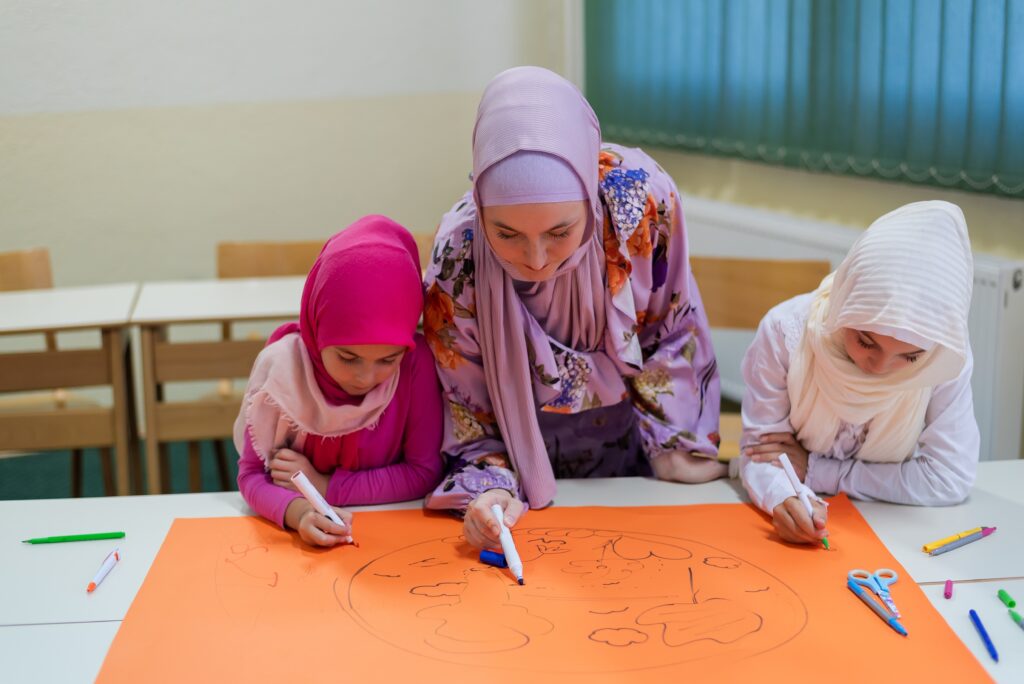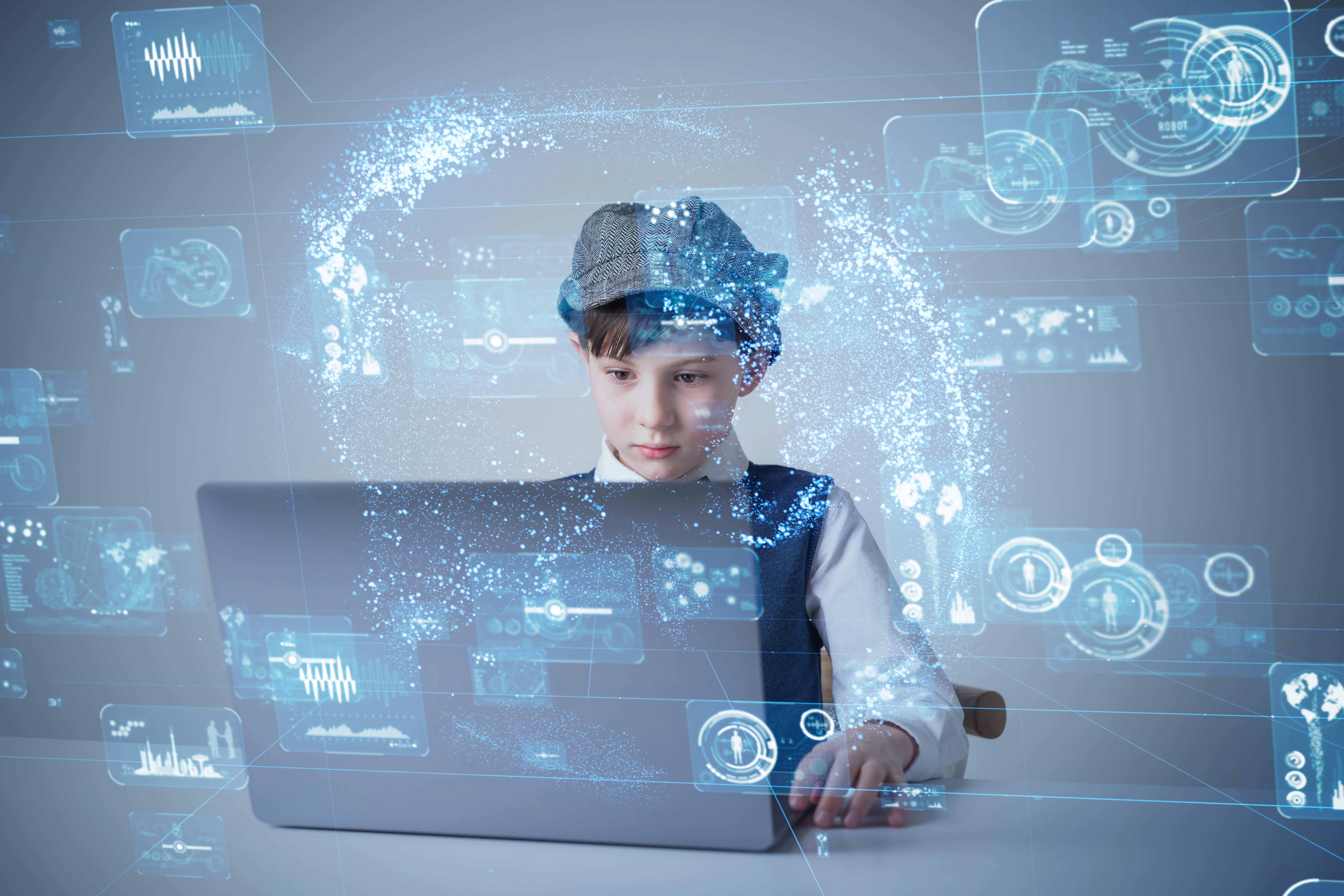While parents and students are fixated on GSCE results today, blogger Najm Al-Din warns that Big Tech is in the process of transforming education in a way which is as far from traditional Islamic education as is possible to imagine.
While many of you will be experiencing the highs and lows of GCSE results day with students and colleagues, I fear many of us have overlooked a development which bodes ominously for the future of education.
The recent disruption to schooling caused by lockdowns demonstrated that a “new normal” was on the horizon, with the muscle memory of traditional workforce operations being slowly upended, prompting many industries to reimagine the future of employment.
With stay-at-home orders ushering in a period of remote learning, it would be remiss to ignore how tech titans and corporations (which were the greatest benefactors of lockdowns) smelt blood in the water from this interruption to normal educational practice, seeing as hybrid teaching offered them a proof of concept for how schools can operate in a future where digital learning is the primary vehicle of education delivery.
I fear what follows in the years ahead with incessant fear-mongering over public health and climate change are similar emergency preparedness measures which diminish the footfall of bricks and mortar businesses, including public educational institutions.
This will accelerate the march towards a platform economy, where schooling will increasingly favour digital business models and scalable tech-based solutions.
Therefore, many leaders of industry and technological giants in particular will have little incentive to revert to pre-pandemic norms and will be eager to capitalise on any future disruption to education by coordinating a global shift towards e-learning.
Subscribe to our newsletter and stay updated on the latest news and updates from around the Muslim world!
So what implications might this have on teachers? Under the duress of another “existential” crisis which the World Economic Forum and its G20 affiliates are anticipating, policies may be drafted to acclimate the current generation of students to the gradual substitution of traditional teacher-based and face-to-face instruction in schools.
We must realise that populations are being corralled into the Fourth Industrial Revolution (4IR), where Artificial Intelligence, robotics and nanotechnology will be deployed at breakneck speed leading to a dramatic downsizing and reshuffling of the global workforce.
At this critical historical juncture, data is the new oil which economists perceive as the most strategic asset that will drive future profitability.
With remote learning already demonstrating the feasibility for a digital curriculum, leading Ed-tech companies like InnovateEDU – which is partnered with Google and the Gates Foundation – will be collaborating towards a new social contract for education. This could entail repurposing public educational institutions into efficient laboratories of data-driven, digital learning, which in the future can create comprehensive online databases of childrens’ academic competence for future workforce optimisation.
Since we are being railroaded into the 4IR under the benevolent guise of public health and climate change, it’s important to prepare for the possibility that next-gen schools may outsource instructional time to AI learning management systems and stimulus-response algorithms, which reduce the demand for face-to-face teaching through personalised STEM-centric learning curriculums.
The tech oligarchs who are bent on transitioning to this new learning ecosystem cannot allow anyone to get between students and their pre-programmed digital curriculums.

If they are to successfully bring the 4IR to fruition, teachers must be slowly phased out of the profession in the next decade to make way for automated teaching bots powered by Generative and Predictive AI, which can potentially supplant human instructors and efficiently manage the future workforce.
Therefore, any drive towards remote learning which I anticipate will return under an emergency pretext will expedite the creation of personalised AI learning programmes to data-mine the cognitive-behavioural data and social-emotional characteristics of students in real-time for social credit. This will be achieved through a plethora of surveillance technologies which can predetermine their career pathways by using psychometric and biometric data to fully integrate them into a planned circular economy.
With formative assessments embedded into AI learning management systems and attainment levels recorded on every student’s personal data dashboard, students of the 4IR may be competing with an international workforce for remote on-demand AI assigned micro-work contracts and low-wage jobs in a gig economy, where they can be managed by hedge funds as debt products via deep learning algorithms.
In these “smart schools,” computer adaptive assessments and wearable technologies can calculate future student workforce competence and childrens’ career pathways will be streamlined into hi-tech corporation specific job-training.
In a future where health and climate fears make the natural world as uninhabitable as possible, I can see how virtual reality training for gig jobs and simulation-based learning applications at home will be adopted by governments under the pretext of the UN Sustainable Development Goals, with virtual education supplying the labour demands of tech companies and private corporations in this Great Reset which is unfolding before our eyes.
This will condition forthcoming student generations to a new corporate value chain, where they can be data-mined and scored on the dashboard of global financiers as part of a predatory “green” financial model known as ESG (Environmental, Social and Governance) investing.
Therefore, those presiding over the data economy will be agitating for the introduction of Digital IDs in schools throughout the UK, as this can convert the student population to datasets and metrics to be managed as human capital through smart contract applications on blockchain.
Why should Muslims be concerned?
As far as education is concerned, far from being a utilitarian experiment, the fundamental purpose of knowledge acquisition and dissemination in Islam is to instil in man a sense of God-consciousness so that we can fulfil our role as vicegerents on this earth.
This noble purpose cannot be actualised if the education system is rendered a vehicle for corporate engineering, with the end game of managing children as tokenised data commodities in a digitised world.
By depersonalising, disconnecting and alienating students from free and spontaneous classroom interactions and ensnaring them into embracing the full gamut of emerging technologies, student populations are being adapted to a cybernetic future which technocrats believe will shift the calculus on what it means to be human.
For students in particular, this will manifest itself through a future curriculum in the metaverse, which is an immersive 3-D-enabled digital space that uses virtual reality, augmented reality, and other advanced semiconductor technology that offers students immersive lessons in cyberspace with virtual avatars.

Therefore, Muslims must be on guard against this paradigmatic shift which threatens to condition children to a transhumanist existence and blur the boundaries between man and machine.
In light of this, I urge all Muslims to heed a very disturbing truth: The technocracy overseeing this new normal does not prioritise human instruction or interpersonal relations which are central to a child’s social and cognitive development.
Rather, they wish to reduce learning to a very narrow and isolated set of data points that can be measured to calculate productivity and determine suitability for employment in the internet of things, robotics and AI.
Therefore, genuine stakeholders in education amongst the ulema must pay closer attention to how teaching unions are being tethered to Big Tech and embark on initiatives to restore an educational system anchored to the Islamic tradition.
While the Shari’ah encourages the adoption of emerging technologies to enrich civilisation, using students as data fodder just so they can be re-skilled to meet the rapidly changing needs of digital labour in an increasingly transhuman world is antithetical to the objectives of Islamic law, according to which ‘ilm (knowledge) in the religious and worldly sciences must be pursued to earn Allah’s pleasure.
Muslims must therefore critically examine whether these disruptive technologies actually empower children to be authentic creators of their own futures in a way which is God-centric, as opposed to being mere consumers of prepackaged content favoured by tech oligarchs who are heavily invested in aggregating student data to build an ed-tech infrastructure and feed narrow markets in digitised labour.
As much as I acknowledge the grave imperfections with the current educational system and recognise the importance of harnessing technologies to aid learning, the one element which should never be sacrificed from education is the human aspect and the opportunity for students to voluntarily pave their own academic and employment future, without this being dictated to them by faceless algorithms.
If we thought the sexualised curriculum targeted at prepubescent children was the height of moral depravity, it may be worth reflecting on how children are being primed by a soulless technocracy to build a computerised prison planet as part of the brave new world for education.























